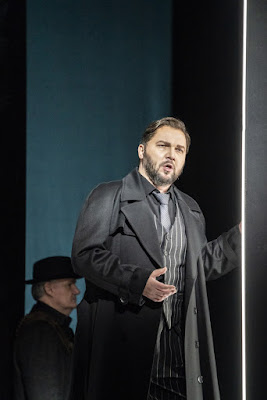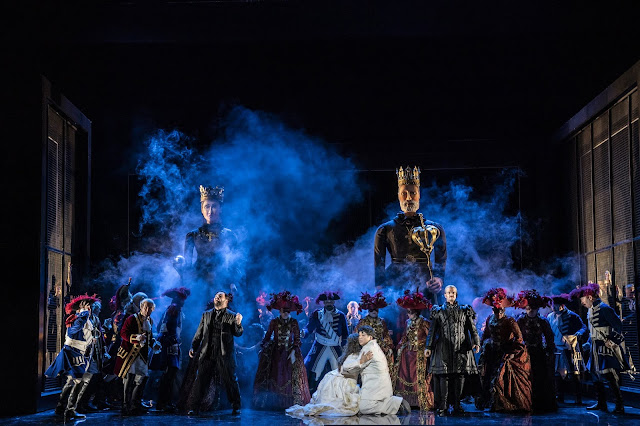 |
| Verdi: Les vêpres siciliennes - Wojtek Gierlach, Anush Hovhannisyan, Jung Soo Yun Welsh National Opera (Photo Johan-Person) |
Reviewed by Robert Hugill on 8 February 2020 Star rating: (★★★★★)
Verdi's French Grand Opera makes a rare appearance in the UK, in a powerful evening from WNO
 |
| Verdi: Les vêpres siciliennes - Wojtek Gierlach Welsh National Opera (Photo Johan-Person) |
In terms of Verdi's operas, Les vêpres Siciliennes, which comes straight after his middle-period trio of Rigoletto, Il trovatore and La traviata, is an important and influential milestone but it is rarely seen in the UK. Till relatively recently it was known mainly from the Italian version, but the BBC's broadcast of the French version in the 1970s was an important milestone (issued on CD by Opera Rara). In the early 1980s the opera was given by English National Opera in John Dexter's production from the Metropolitan Opera, New York with Rosalind Plowright as Helene. And in 2013 the Royal Opera House presented Stefan Herheim's new production of Les vêpres Siciliennes [see my review], but in between seems silence. Welsh National Opera last performed the work in 1954, so the company's new production held great interest.
Welsh National Opera's new production of Verdi's Les vêpres Siciliennes, the final of David Pountney's three middle-period Verdi operas for WNO (previously La forza del destino and Un ballo in maschera), opened at the Wales Millennium Centre on Saturday 8 February 2020. Carlo Rizzi conducted with Jung Soo Yun as Henri, Anush Hovhannisyan as Helene, Giorgio Caoduro as Guy de Montfort, Wojtek Gierlach as Procida, plus Wyn Pencarreg as Le Sire De Béthune, Christine Byrne as Ninette, Robyn Lyn Evans as Daniéli / Mainfroid, Gareth Brynmor John as Robert, Alexander Sprague as Thibault, and Alastair Moore as Le Comte de Vaudemont. Choreography was by Caroline Finn with dancers from the National Dance Company of Wales. Sets were designed by Raimund Bauer, and costumes by Marie-Jeanne Lecca.
Staging a French Grand Opera is a tricky business, the rather formalised structure can be somewhat unyielding, and Les vêpres Siciliennes is not helped by Verdi and Scribe's fraught relationship (the librettist was some 20 years older than the composer), with the librettist refusing Verdi's requests for revisions so that the final act sags somewhat.
 |
| Verdi: Les vêpres siciliennes - Christine Byrne, Anush Hovhannisyan, Robyn Lyn Evans Welsh National Opera (Photo Johan Person) |
Casting French Grand Opera can be equally tricky, Verdi's Les vêpres Siciliennes requires lyric voices, yet ones capable of significant stamina. Henri is not an heroic role but it is a big sing, he is in all five acts, and for all Helene's passion she needs to be able to sing the roulades in her Act Five bolero.
The nub of the opera's drama lies in a sequence of duets and ensembles, a familiar Scribe trope, and the four principals, Anush Hovhannisyan, Jung Soo Yun, Giorgio Caoduro and Wojtek Gierlach, drew us into a web of taut relationships.
Hovhannisyan impressed on her first entry by her quality of stillness, and Hovhannisyan made Helene's character only gradually unfold. throughout the opera. Her bolero in Act Five, dramatically redundant but the opera's hit number, was beautifully done though at other times during the opera her tendency to approach notes from below veered toward the mannered. She made an affecting Helene and was finely partnered by Jung Soo Yun as a very intense and passionate Henri. Jung Soo Yun made him surprisingly sympathetic, and his pair of duets with Hovhannisyan fair crackled. The first moving from tentative love to a strange combination of passion and revenge, the second when she forgives him his betrayal of the conspirators when he admits he is Guy de Montfort's son.
 |
| Verdi: Les vêpres siciliennes - Giorgio Caoduro - Welsh National Opera (Photo Johan Person) |
Giorgio Caoduro made a lithe Guy de Montfort, bringing out the character's complexity. Part of the opera's brilliance is that he is not entirely unsympathetic whilst Wojtek Gierlach's Procida (notionally an heroic figure) is not entirely sympathetic. Giorgio Caoduro does not have the amplitude of voice of the classic Verdi baritone, but instead gave us lithe intensity and a willingness to do much more than swish around twirling his evil cape. Procida, the key conspirator, is an under-written character. Wojtek Gierlach made him admirably human whilst not neglecting his single-minded intensity. It is Procida who drives the plot with its resulting conflagration at the end and Gierlach did not disappoint.
 |
| Verdi: Les vêpres siciliennes - Welsh National Opera (Photo Johan Person) |
The opera requires a substantial chorus, the opening scene features choruses of both Sicilians and French, and the WNO chorus was in terrific form. David Pountney's skilled stage-craft showed in the way he effortlessly marshalled his forces and the singers responded brilliantly.
Choreographer Caroline Finn wisely did not attempt anything too advanced. Her Act Two folk-dance was a lively delight, all the more pointed for the day it ended as, egged on by Procida, the French troops abducted the women. The Four Seasons ballet in Act Three is one of Verdi's most developed ballet sequence (Kenneth MacMillan created a ballet based in it in 1975), but it was a trifle too long for the narrative of Guy de Montfort and Henri's mother, no matter how affectingly danced. For the opening of Act Five, David Pountney sought to remedy the work's dramatic deficiencies by having the dancers as elderly and severely put-upon servants, preparing first Helene and then Henri for their marriage, scenes which struck the only really false note in the production.
In the pit, Carlo Rizzi and the orchestra showed admirable understanding of the opera's style. The orchestra of the Paris Opera was a large and crack ensemble and Verdi took advantage of this. From the opening notes of the overture it was clear that we were in for a glorious evening.
Any staging of Les vêpres Siciliennes is a major undertaking and it is to the WNO, David Pountney, Carlo Rizzi and the cast's credit that they turned the piece into an evening full of vivid drama and made a coherent whole from this complex work without every straying far from the concept of French Grand Opera.
The libretto for Les vêpres Siciliennes was based on one that Scribe wrote for Donizetti in 1839, Le duc d'Albe. This never reached completion though Opera Rara has recorded Donizetti's torso, and I am still waiting for an inventive company to produce both operas in the same season, though perhaps that is only for French Grand Opera nerds like me.
 |
| Verdi: Les vêpres siciliennes - Welsh National Opera (Photo Johan Person) |
Elsewhere on this blog
- For a piece to suit the requirements of a particular occasion is the ultimate praise: composer Bernard Hughes chats about his approach to composing & his new disc of music for narrator & orchestra, Not Now, Bernard! - interview
- Opera to Die For: the National Opera Studio in opera scenes from Mozart to Britten through Gounod, Puccini, Janacek & Ullmann at Sadler's Wells - opera review
- Monteverdi to Italian contemporary music by way of Cage, Berio & Glass: Highlands and Sea from Laura Catrani and Claudio Astronio (★★★½) - CD review
- Arianna: Kate Lindsey & Arcangelo bring Ariadne vividly to life in cantatas by Scarlatti, Handel & Haydn - (★★★★) CD review
- An evening with Rosina Storchio: Ermonela Jaho's Wigmore Hall debut celebrates Opera Rara's 50th anniversary (★★★★) - concert review
- Music conceived of through restriction, which paradoxically gives the composer freedom: I chat to composer & Royal Academy of Music lecturer Alex Hills - Interview
- A touch of heaven: The Divine Muse, Mary Bevan & Joseph Middleton in Wolf, Schubert & Haydn (★★★★) - concert review
- A welcome chance to hear the Orchestra National de Lille under its music director Alexandre Bloch in London, in Ravel, Debussy and Beethoven (★★★★) - concert review
- From Georgia to Lotus Land: pianist Nino Gvetadze in music by Cyril Scott (★★★½) - CD review
- Genesis: accordionist Bartosz Glowacki's fine debut recording moves from Scarlatti & Rameau to Trojan, Gubaidulina, Vlasov, Pärt & Piazzolla (★★★★) - CD review
- Superb ensemble showcase: Opera North's new production of Kurt Weill's Street Scene (★★★★½) - opera review
- Audience development and evangelism at the core of what they do: I chat to Adam Szabo of the Manchester Collective - interview
- Home




.jpg)






No comments:
Post a Comment